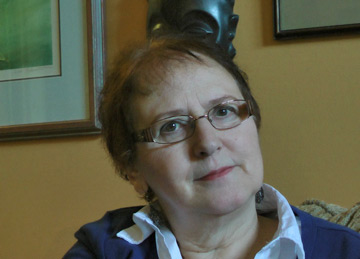Barbara

Cared for several people
Age at interview: 62
Age at start of caregiving: 40
Barbara is single, 62 years old, and lives alone (with several cats and a dog) above a bakery. She worked as an entrepreneur in the retail and food industry and is now retired because of diagnosis of multiple sclerosis (MS) although has been very active with volunteer work for caregivers. She looked after her mother, father, husband and, aunts and uncles over a period of 20 years. Barbara provided care for her mother who was blind and her father who had several illnesses (COPD, CHF and stroke). Barbara’s husband developed rheumatoid arthritis and she was his primary caregiver for many years, although they no longer live together.
Barbara was diagnosed with MS about 20 years ago, and after a period of serious illness, her own health is now more or less stable. Barbara has been a caregiver for many years for many different people in her life – her father, mother, aunts and uncles, and her husband. She describes her role as a caregiver in these situations as more of an organizer and advocate for her family members, for example, providing assistance with interactions with the healthcare system and in making decisions about living arrangements. Helping in this way, however, has been challenging as many of these events were happening in the same time period, along with the eventual separation between Barbara and her husband.
Barbara feels that the stress of her caregiving role has taken more of a toll on her mental health (rather than affecting her MS). She speaks about the differences between caregiving for a spouse versus an older parent, stating that there is an anger and isolation that comes from the losses incurred by having to care for a chronically ill spouse – for example, loss of relationship, intimacy, and mutual caring.
Barbara would love health care professionals to know and to recognize that caregiving is like a circle where you find different kinds of health care professionals, the care facilities but also the family caregiver. If the chain of caregiving surrounding the patient suddenly breaks, an essential part in caregiving is missed. This is why it is important to make sure that there is sufficient support and recognition for the caregiver to enable him or her to continue the care.
Barbara has found enormous support from participation in local caregiver support groups as well as from the educational programs run by these organizations. She has also worked hard to give back to these groups as a leader and organizer. Barbara feels that healthcare professionals should value and respect more the role that caregivers play in helping to care for patients.
More content
- What is it like to be a caregiver? – BarbaraFor Barbara, the experience broadens people’s minds.
- Future and caregiving – BarbaraBarbara worried about how her mother’s dementia would develop. But when her mother died unexpectedly, she realized she had been wasting her energy worrying.
- Society and caregiving – BarbaraPeople find it really difficult to hear about illness says Barbara.
- Resources – BarbaraBarbara found it really helpful to learn what to expect when you are caring. She found out about the support group through a medical professional.
- Personal growth and transformation – BarbaraThere is an incredible amount of joy in caregiving, says Barbara.
- Navigating the system – BarbaraBarbara was very concerned about bringing her father home, and did not know where to turn when she was told that he would have to leave the hospital.
- Interaction with professionals – BarbaraAfter a disagreement with her father’s physician about his ability to drive, Barbara’s father had a seizure while driving.
- Caring for yourself – BarbaraThe situation may be sad and tragic, but don’t be afraid to enjoy funny moments, says Barbara.
- Advice for professionals and society (2) – BarbaraBarbara would like doctors to recognize that caregivers are an important part of a patient’s circle of care. If caregivers are engaged, then doctors' jobs are easier.
- Advice for professionals and society – BarbaraBarbara thinks that physicians can help people identify themselves as caregivers and help them find support.